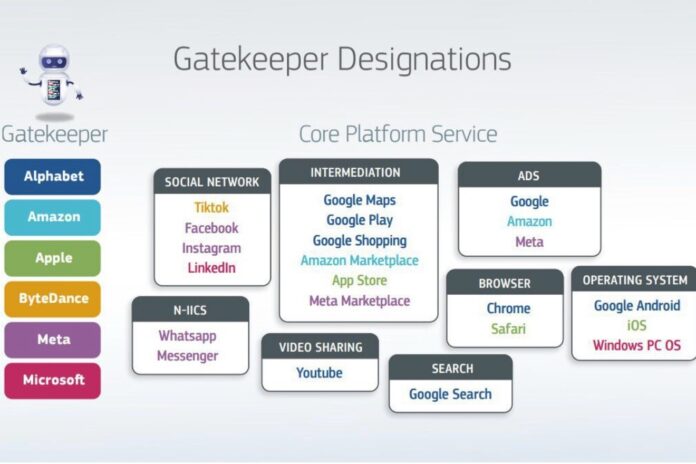The EU’s Digital Markets Act, aimed at Big Tech, comes into force in March with hefty fines for failure to comply
The European Commission has published the names of six gatekeepers and their specific business activities that are to be covered by the new Digital Markets Act (DMA).
There are no surprises as they already appeared on a provisional list earlier in the year. The confirmed list comprises Alphabet (Google’s parent company), Amazon, Apple, ByteDance (owner of TikTok), Meta (formerly Facebook) and Microsoft. They are all US corporations apart from ByteDance which is Chinese.
The Commission also lists the 22 platform-based services (see graphic above, courtesy of the European Commission) they collectively provide that are will be covered by the DMA and which must comply with the new law by March 2024.
Anti-monopoly
The Act is intended to end the monopolistic power and anti-competitive behaviour of the named Big Tech companies. It will force them to allow rival companies to compete on their platforms from next March. In other words, consumers will be no longer obliged to use only the gatekeepers platforms and products, or those of their preferred partners.
If the gatekeepers don’t comply, they will be hit with fines of up to 10% of their total, annual, worldwide turnover. This could be increased to 20% for repeat offences. In addition, if the Commission views the degree of non-compliance to be extreme, it could forcibly break up the offenders and/or ban them from buying smaller competitors.
It remains to be seen how straightforward it will be to enforce these sanctions.
The gatekeepers will also be obliged to provide free updates to companies that buy or sell ads on their platforms, ending the practice of social media networks forcing them to have a specific type of account to access the apps and services they offer. There is the full list of what the Big Tech companies must, and must not, do here.
Enforcement will not be easy
The European Commission is the sole enforcer of the DMA. A joint team in the Directorates-General for Competition (DG COMP) and Communications Networks, Content and Technology (DG CONNECT) is responsible for the implementation and enforcement of the DMA.
Naturally Big Tech is not going to take this lying down. Some have unleashed armies of lawyers and are trying to overturn some of the designations. There is reason to hope they will have some success: for instance in July 2020, Margrethe Vestager lost the attempt to claim €13 billion unpaid taxes she thought Apple should pay in Ireland. Her case was overturned by the EU General Court.
Meta claimed the EU has delayed the roll out of its Threads app with which it wants to take on X, the service formerly known as Twitter because of concerns about DMA compliance. Amazon challenged the Commission in July about being designated as a very large platform under the EU’s news Digital Services Act regarding harmful content.
However, like GDPR before it, overall the DMA is looking like something of an unstoppable force that will have repercussions well beyond Europe, which is seen as pioneer in reining in Big Tech and is an example others could follow. Also, the European bloc is a sufficiently large market to have an impact.


